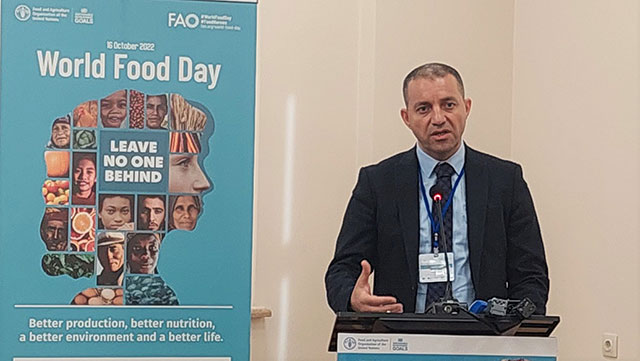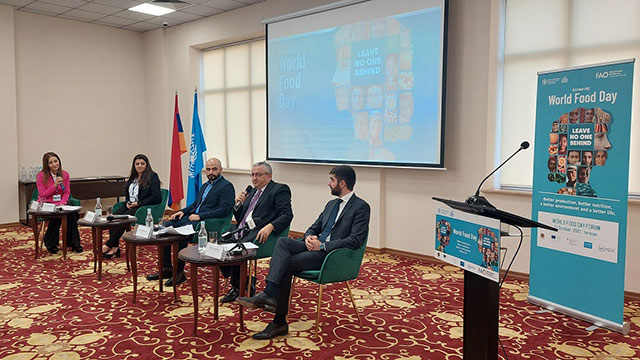13 October 2022, Yerevan – In the run up to World Food Day 2022, the Food and Agriculture Organization of the United Nations (FAO) held a World Food Day Forum in partnership with the Ministry of Economy of Armenia, the Austrian Development Agency, the Swiss Cooperation for the South Caucasus, the UN World Food Programme, and the United Nations Children’s Fund.
The Forum focused on the “four betters” of FAO – better production, better nutrition, a better environment and a better life for all. The aim was to discuss current challenges in the field of food and agriculture in Armenia and the ways to overcome them. The event brought together a wide range of partners including the Government of Armenia, international and donor community, civil society organizations, academia, and businesses.
The Minister of Economy of Armenia Vahan Kerobyan noted: “I am sure that the agreements reached as a result of today’s discussions will lead to raising food security issues, planning measures aimed at the development of the economy, increasing the level of accessibility and availability of nutritionally diversified food, analysing, managing and forecasting the situation in the field of food security.”
“Sustainable agrifood systems influence how we eat, how we live and how healthy we are and therefore are key drivers for a more equitable and prosperous future,” said Raimund Jehle, FAO Representative in Armenia. “Agrifood systems transformation is critical if we want to honour our pledge to deliver better production, better nutrition, a better environment, and a better life leaving no one behind and,” he added.
World Food Day 2022 is being marked in a year with multiple global challenges including the ongoing pandemic, conflicts, climate change, rising prices and international tensions. All of this is affecting global food security. Today, hunger continues to rise and it affected 828 million people in 2021 – an increase of about 46 million people since 2020, and 150 million since 2019. Collective action on World Food Day across 150 countries worldwide promotes worldwide awareness and action for those who suffer from hunger and for the need to ensure healthy diets for all, leaving no one behind.
It’s time to work together and create a better, more sustainable future for all.
NOTE TO EDITORS:
FAO’s Strategic Framework and the four betters
In the face of global crises, global solutions are needed more than ever. Sustainable and holistic solutions that consider development in the long term, fostering inclusive economic growth, addressing inequalities and building greater resilience.
FAO Strategic Framework 2022–31 seeks to support the 2030 Agenda through the transformation to MORE efficient, inclusive, resilient and sustainable agrifood systems for better production, better nutrition, a better environment, and a better life, leaving no one behind.
The four betters represent an organising principle for how FAO intends to contribute directly to SDG 1 (No poverty), SDG 2 (Zero hunger), and SDG 10 (Reduced inequalities) as well as to supporting achievement of the broader SDG agenda, which is crucial for attaining FAO’s overall vision.
Better production
Ensure sustainable consumption and production patterns, through efficient and inclusive food and agriculture supply chains at local, regional and global level, ensuring resilient and sustainable agrifood systems in a changing climate and environment.
Better nutrition
End hunger, achieve food security and improved nutrition in all its forms, including promoting nutritious food and increasing access to healthy diets.
Better environment
Protect, restore and promote sustainable use of terrestrial and marine ecosystems and combat climate change (reduce, reuse, recycle, residual management) through more efficient, inclusive, resilient and sustainable agrifood systems.
Better life
Promote inclusive economic growth by reducing inequalities (urban/rural areas, rich/poor countries, men/women).


























































